
Tel :18138443506
Phone :13798439478
Email :mammon.xu@zhixin-cert.com
Addr :Floor 3, No. 5, Shanglian New Village, Shangcun Community, Gongming Street, Guangming District, Shenzhen (Chuangxin Office Building)
Brazil INMETRO certification
Introduction to Certification
INMETRO (The National Institute for Metrology, Standardization and Industrial Quality) is the abbreviation of the National Bureau of Measurement Standards and Industrial Quality of Brazil. The INMETRO certification under its control includes safety and energy efficiency. INMETRO is not only a mandatory certification mark in Brazil, but also a national certification authority in Brazil. It is responsible for the supervision and audit of its authorized certification bodies and laboratories, as well as the implementation and development of the Brazilian standard certification system.
At present, qualification issuing institutions include TUV, SGS, UL, BV, NCC, ITS and other institutions, and there are about 534 qualification laboratories. Brazilian product standards are mostly based on IEC and ISO standards.
371 Decree
Initially, the certification did not include household appliances. However, with the increase in the import of household appliances, on December 29, 2009, the Brazilian government issued 371 Decree, stipulating that a variety of household appliances should be added to the compulsory certification directory. According to the statutory requirements, from July 1, 2011, household and related electrical products (such as kettles, electric irons, vacuum cleaners, etc.) sold to Brazil must be subject to the mandatory certification of INMETRO.
When domestic factories and traders apply to the Brazilian certification authority, they must provide the Brazilian importer or agent as the local legal representative for INMETRO certification. The representative will be responsible for the products entering the Brazilian market, providing after-sales service for consumers, handling consumer complaints, etc.
According to Decree 371 of December 29, 2009, household appliances sold to Brazil and applicable to IEC60335-1&IEC 60335-2-x standards must comply with the requirements of this Decree. For producers and importers, the Act gives a three-stage timetable for specific implementation. The specific timetable is as follows:
From 1 July 2011 – Manufacturers and importers shall produce and import only certified equipment.
From July 1, 2012 – Manufacturers and importers can only sell certified equipment to the retail/wholesale industry.
Since January 1, 2013 – the retail/wholesale industry can only sell certified equipment.
Product scope
At present, product certification in Brazil is divided into mandatory certification and voluntary certification. Compulsory certified products include: household appliances and similar products, pumps, fluorescent lamps, toys, wires and cables, switches, plugs and sockets, circuit breakers, electronic ballasts, etc; Voluntary products include IT/AV products, electric tools and other products. As of December 2014, the compulsory certification covers 113 products.
Application process
1. The customer sends samples to Waltek Laboratory, and Waltek issues test reports
2. At the same time, apply to the issuing authority for the first factory inspection, including the review of the factory and the Brazilian buyer
3. After the test and factory inspection are completed, the certificate issuing agency will issue the INMETRO certificate based on the document review
Certification mark


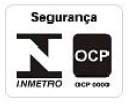

All products that meet Brazilian standards and other technical requirements must be affixed with the mandatory INMETRO logo and the logo of an approved third-party certification authority, and the logo must be printed on the product nameplate or outer package along with the issuing authority code (OCP) to enter the Brazilian market. The marks are as follows:
Other information
Technical information: voltage frequency AC127V-220V/60HZ, plug ABNT NBR NM 60884-1:2004
Mandatory: mandatory+voluntary
Validity of certificate: 2 years/3 years/5 years (3 years for household appliances) based on products
Factory inspection requirements: first factory inspection+annual review (for both manufacturers and Brazilian buyers)
Requirements of the holder: local agency is required
Brazilian ANATEL certification
Introduction to Certification
ANATEL is the Brazilian regulatory agency for telecommunications and radio equipment, with its headquarters in Brasilia. ANATEL certification is mainly aimed at telecommunication products, which are divided into three categories. Among them, Category 1 products have the most strict control. In addition to being tested by a qualified laboratory, there are also factory inspection requirements (ISO9000 certificate).
Before obtaining the formal approval of ANATEL, the applicant must apply to the certification and evaluation institutions (CABs) recognized by ANATEL for the COC of the product conformity statement, and apply for the CoC based on the test report and product data. The certificate issued by ANATEL can only be obtained after the corresponding files are prepared through CABs. Please note that the instructions and nameplates only accept Portuguese.
Product scope
Type I: terminal equipment connected to FSTS through endpoint; Equipment connecting private telecommunication network to FSTS network; A device connected to the FSTS network for the purpose of providing value-added services. Such as common mobile phones, lithium batteries and other products.
Type II: Any equipment using radio not covered by Type I, such as low-voltage devices, unlicensed equipment and antennas.
Type III: Any equipment not covered by Type I or II that is subject to the rules and regulations of ANATEL.
Application process
1. The customer submits samples and data to Waltek
2. Send the sample to the qualified laboratory for testing, and issue the test report after the test is completed
3. The qualification issuing agency reviews the test report, issues the CoC certificate, and the product can be cleared
4. ANATEL reviews the documents, completes the registration and makes the product marketable
Certification mark
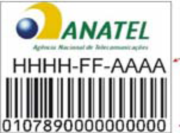
Other information
Technical information: voltage frequency AC127V-220V/60HZ, plug ABNT NBR NM 60884-1:2004
Mandatory: mandatory
Validity period of certificate: 1 year/2 years/permanent validity based on product category
Factory inspection requirements: Not required (ISO9001 certificate is required for Class I products)
Requirements of the holder: local agency is required
Brazil noise level declaration (SELO RUIDO)
Introduction to Certification
Decree No. 105 of Inmetro on May 31, 2004 stipulates that the use of SELO RU Í DO is mandatory for the following noise prone electrical appliances. SELO RU Í DO aims to provide consumers with information on the noise emitted by household electricity, so that products that are quieter and encouraged to manufacture have low noise levels under the same conditions can be selected.
Product scope
Vacuum cleaner NBR 13910-1/97 e IEC 60704-2-1
Mixer NBR 13910-1/97 e NBR 13910-2-3/98
Hair dryer NBR 13910-1/97 e NBR 13910-2-2/98
Application process
1. The customer prepares samples and materials, and submits the application to Waltek
2. The qualified laboratory shall conduct the test and issue a noise level declaration after the test
3. Importers apply to IBAMA for authorization to use SELO RU Í DO based on noise level claims
Label requirements
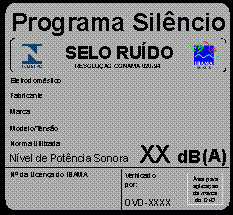
Other information
Technical information: voltage frequency AC127V-220V/60HZ, plug ABNT NBR NM 60884-1:2004
Mandatory: mandatory
Validity period of the certificate: no validity period, and the validity shall be maintained through annual review
Factory inspection requirements: None
Requirements of the holder: local agency is required
Brazil Energy Efficiency Certification PBE/PROCEL
Introduction to Certification
Energy Efficiency Labeling Program (PBE)
The Program Brasileiro de Etiquetagem (PBE) originated from the agreement signed between the Ministry of Industry and Trade of Brazil and the Brazilian Association of Electronics and Electric Industries (ABINEE) in 1984 under the intervention of the Ministry of Mines and Energy. According to the National Law on Energy Conservation and Rational Use of Energy issued in October 2001 and Law 4059 issued in December of the same year, this plan has become a mandatory energy efficiency labeling plan.
Similar to the EU energy label, the Brazilian PBE energy efficiency label, in addition to the energy efficiency level (from the highest energy efficiency level A to the lowest energy level G), also contains the manufacturer's name, trademark, product model, power consumption or water consumption, and product characteristics and other information. The test must be completed by the local laboratory in Brazil authorized by INMETRO and cannot be conducted in China. In addition, the application must be made directly to INMETRO by the Brazilian legal agent or the actual importer.
National Power Energy Conservation Plan (PROCEL)
The PROCEL flag is part of the PBE flag. In 1985, Brazil adopted Resolution 1877 to launch the National Power Energy Conservation Plan (PROCEL), and then the Presidential Decree passed on December 8, 1993 officially launched the PROCEL plan. The PROCEL plan is proposed by the Ministry of Mines and Energy (MME), coordinated by INMETRO, and now under the management of ELETROBR Á S.
The PROCEL flag plan is a branch of the PBE plan. The PROCEL mark is an energy-saving certification mark. Obtaining this mark for electrical products means that electrical equipment reaches the best energy efficiency level and consumes less energy. As a part of PBE, this mark is issued annually to electrical products that have achieved a higher energy efficiency level and meet the statutory requirements.
The PROCEL plan is voluntary participation, and the participating institutions and manufacturers will conduct energy efficiency tests on products. After product testing, the management organization will develop a standard based on the results, and then classify the equipment according to the standard. These tests will be conducted regularly, and the standard will be updated accordingly. According to the current products with the best performance in energy consumption standards, the electrical appliances that have been tested and judged to have the best performance in this category will get the PROCEL certification mark. After a period of implementation or review, there will be up to 25% or more energy efficient products in each category. Therefore, the PROCEL program has contributed to the implementation of the energy efficiency labeling program by establishing the basis of measurement methodology. The validity period of the PROCEL plan is December 31 of the year when the certificate is issued. After the certificate expires, it is not necessary to re test the product, but only to renew it. However, for some devices, the validity period is 365 days from the date of authorized use. According to the requirements of the National Energy Conservation and Rational Use of Energy Law, the voluntary certification scheme of the PROCEL logo has been transformed into a mandatory certification.
Product scope
The products controlled by PBE plan include: refrigerators, freezers, ceiling fans, air conditioners, washing machines, gas stoves, gas water heaters, electric showers, incandescent and fluorescent lamps, ballasts, centrifugal pumps and other products.
The products controlled by the PROCEL logo include: solar shower appliances, window/split air conditioners, refrigerators, fluorescent lamps, sodium lamps, sodium lamp inductive ballasts, full-automatic/semi-automatic washing machines, high-performance/standard three-phase induction motors, single door/double door/frost free refrigerators, low-voltage/high-voltage solar energy heat storage tanks, televisions, ceiling fans and other products.
Application process
1. The customer prepares samples and submits them to Waltek
2. Waltek sends samples to the qualified laboratory for testing and issues the test report
3. The Brazilian importer directly applies to INMETRO for energy efficiency registration based on the test report
Label requirements
Left PBE, right PROCEL
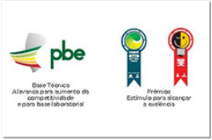
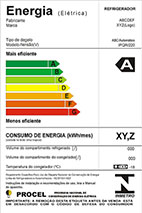
Other information
Technical information: voltage frequency AC127V-220V/60HZ, plug ABNT NBR NM 60884-1:2004
Mandatory: mandatory
Validity of certificate: 1 year
Factory inspection requirements: None
Requirements of the holder: local agency is required
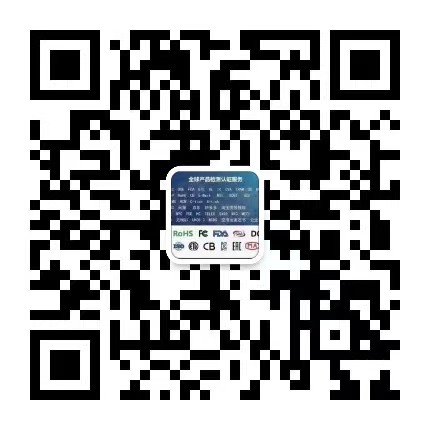

Service Hotline
18138443506
13798439478